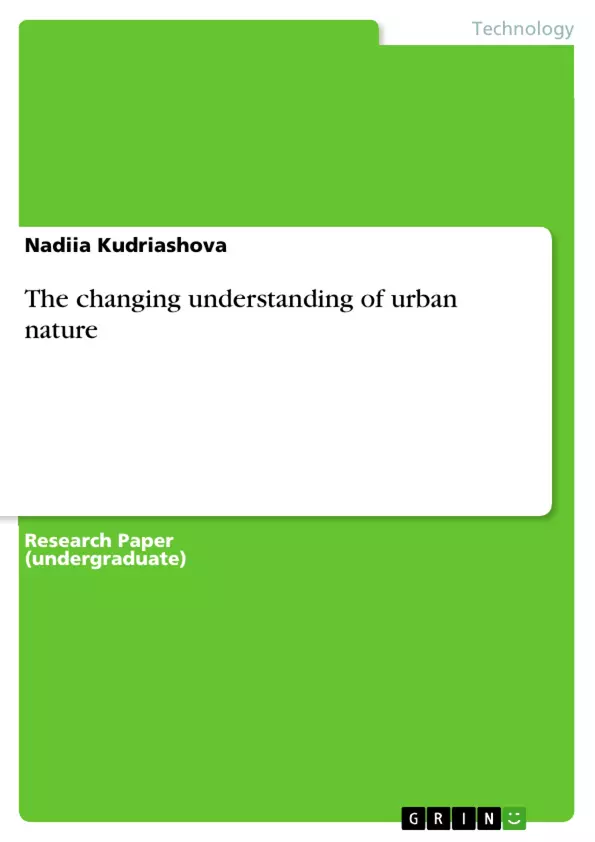Since the 19th century, the countries of the Western world have entered the era of the industrial revolution. The new way of life, the development of science and industry had a huge impact on all aspects of society. At this time, in the major cities of the world, problems of a social, economic, and environmental nature were sharply aggravated. In the middle of the 19th century, ecology emerged as an independent science. The birth of a new direction of research was, on the one hand, the result of the progressive development of knowledge about nature, and on the other hand, a precursor of the ecological problems of the planet already accumulating by that time. Architects and city planners of the time began to propose various urban planning concepts, in which an attempt was made to solve new problems generated by the development of technical civilization. Similar theories and concepts continued to be advanced later, throughout the 20th century. At present, the concept of sustainable development, which aims to create a high-quality living environment that satisfies all the demands of society, is becoming increasingly used (Hall 2014b). The concept of a sustainable city has gone through a long evolutionary path of development, the consideration of which is of great interest for understanding the essence of the concept and its practical implementation in the cities of the world.
Inhaltsverzeichnis (Table of Contents)
- The changing understanding of urban nature
- The Garden City
- Greater London
- The Ecopols
- Sustainable Urban Development
Zielsetzung und Themenschwerpunkte (Objectives and Key Themes)
This text explores the evolution of urban planning concepts, focusing on how the understanding of nature in urban settings has shifted over time. It traces the development of ideas from the garden city movement to the modern concept of sustainable urban development.
- The influence of industrialization and urbanization on urban planning
- The emergence of ecological thinking in urban design
- The evolution of garden city concepts
- The rise of sustainable urban development
- The importance of green spaces and nature in urban environments
Zusammenfassung der Kapitel (Chapter Summaries)
- The changing understanding of urban nature: This section introduces the historical context of urban planning, highlighting the challenges posed by industrialization and the rise of ecology as a scientific field. It sets the stage for the subsequent discussion of urban planning concepts.
- The Garden City: This chapter focuses on the Garden City movement, discussing its origins, principles, and key features. It analyzes the impact of Ebenezer Howard's ideas and the development of Letchworth as a model garden city. It also discusses the implementation of garden city principles in other parts of the world.
- Greater London: This chapter examines the post-World War II developments in urban planning, particularly the "Greater London" project led by Patrick Abercrombie. It explores the evolution of the garden city concept in this context, including the development of suburban gardens and satellite cities.
- The Ecopols: This chapter delves into the concept of the "ecopols," which emerged in the 1970s. It outlines the key principles of ecopolis design, focusing on ecological sustainability, green spaces, and the integration of nature into urban environments.
Schlüsselwörter (Keywords)
Urban planning, garden city, sustainable development, ecopolis, green spaces, nature, urbanization, ecological thinking, industrialization, urban design, environmental sustainability.
Frequently Asked Questions
How has the understanding of urban nature changed since the 19th century?
The text traces the evolution from industrial-era problems to ecological thinking and modern sustainable urban development concepts.
What is the "Garden City" movement?
Initiated by Ebenezer Howard, it proposed self-contained communities surrounded by "greenbelts," combining the benefits of both city and countryside.
What does "Sustainable Urban Development" aim for?
It aims to create high-quality living environments that satisfy societal demands while maintaining ecological balance and resource efficiency.
What was the "Ecopolis" concept of the 1970s?
The Ecopolis design focused on ecological sustainability and the deep integration of nature and green spaces into the urban fabric.
How did Patrick Abercrombie influence London's urban nature?
His "Greater London" project applied garden city principles to the post-WWII development of suburban gardens and satellite cities.
- Quote paper
- Nadiia Kudriashova (Author), 2018, The changing understanding of urban nature, Munich, GRIN Verlag, https://www.grin.com/document/484510



